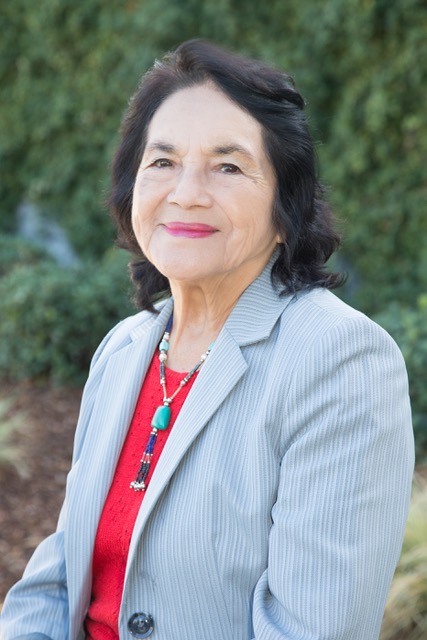
Buy Ticket for 2019 Latina Trailblazers Here
Dolores Clara Fernandez was born on April 10, 1930 in Dawson, a small mining town in the mountains of northern New Mexico. Her father Juan Ferånández, a farm worker and miner by trade, was a union activist who ran for political office and won a seat in the New Mexico legislature in 1938. Dolores spent most of her childhood and early adult life in Stockton, California where she and her two brothers moved with their mother, following her parents’ divorce.
According to Dolores, her mother’s independence and entrepreneurial spirit was one of the primary reasons she became a feminist. Dolores’ mother Alicia was known for her kindness and compassion towards others. She offered rooms at affordable rates in her 70 room hotel, which she acquired after years of hard work. Alicia welcomed low-wage workers in the hotel, and often, waived the fee for them altogether. She was an active participant in community affairs, involved in numerous civic organizations and the church. Alicia encouraged the cultural diversity that was a natural part of Dolores’ upbringing in Stockton. The agricultural community where they lived was made up of Mexican, Filipino, African-American, Japanese and Chinese working families.
Alicia’s community activism was reflected in Dolores’ involvement as a student at Stockton High School. She was active in numerous school clubs, was a majorette, and a dedicated member of the Girl Scouts until the age of 18. Upon graduating Dolores continued her education at the University of Pacific’s Delta College in Stockton earning a provisional teaching credential. During this time she married Ralph Head and had two daughters, Celeste and Lori. While teaching she could no longer bear to see her students come to school with empty stomachs and bare feet, and thus began her lifelong journey of working to correct economic injustice.
An Organizer is Born
Dolores found her calling as an organizer while serving in the leadership of the Stockton Community Service Organization (CSO). During this time she founded the Agricultural Workers Association, set up voter registration drives and pressed local governments for barrio improvements. It was in 1955 through CSO founder Fred Ross, Sr. that she would meet a likeminded colleague, CSO Executive Director César E. Chávez. The two soon discovered that they shared a common vision of organizing farm workers, an idea that was not in line with the CSO’s mission.
As a result, in the spring of 1962 César and Dolores resigned from the CSO, and launched the National Farm Workers Association. Dolores’ organizing skills were essential to the growth of this budding organization. The challenges she faced as a woman did not go unnoted and in one of her letters to Cesar she joked…”Being a now (ahem) experienced lobbyist, I am able to speak on a man-to-man basis with other lobbyists.”
The first testament to her lobbying and negotiating talents were demonstrated in securing Aid For Dependent Families (“AFDC”) and disability insurance for farm workers in the State of California in 1963, an unparalleled feat of the times. She was also instrumental in the enactment of the Agricultural Labor Relations Act of 1975. This was the first law of its kind in the United States, granting farm workers in California the right to collectively organize and bargain for better wages and working conditions
While the farm workers lacked financial capitol they were able to wield significant economic power through hugely successful boycotts at the ballot box with grassroots campaigning. As the principal legislative advocate, Dolores became one of the UFW’s most visible spokespersons. Robert F. Kennedy acknowledged her help in winning the 1968 California Democratic Presidential Primary moments before he was shot in Los Angeles. Throughout the years she has worked to elect numerous candidates including President Clinton, Congressman Ron Dellums, Governor Jerry Brown, Congresswoman Hilda Solis and Hillary Clinton.
Women’s Liberation
As much as she was Cesar’s right hand she could also be the greatest thorn in his side. The two were infamous for their blow out arguments an element that was a natural part of their working relationship. Dolores viewed this as a healthy and necessary part of the growth process of any worthwhile collaboration. While Dolores was busy breaking down one gender barrier after another, she was seemingly unaware of the tremendous impact she was having on, not only farm worker woman but also young women everywhere.
While directing the first National Boycott of California Table Grapes out of New York she came into contact with Gloria Steinem and the burgeoning feminist movement who rallied behind the cause. Quickly she realized they shared much in common. Having found a supportive voice with other feminists, Dolores consciously began to challenge gender discrimination within the farm workers’ movement.
